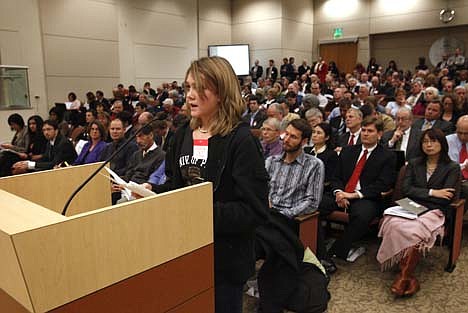California on verge of greenhouse gas rules
SACRAMENTO, Calif. (AP) - California is on the verge of creating the first system in the nation to give polluting companies such as utilities or refineries financial incentives to emit fewer greenhouse gases.
They hope their plan will inspire other states to follow, while officials in the state - the world's eighth-largest economy - discuss plans to link the new system with similar ones under way or being planned in Canada, Europe and Asia.
California is trying to "fill the vacuum created by the failure of Congress to pass any kind of climate or energy legislation for many years now," said Mary Nichols, chairwoman of the state's air quality board.
The board began hearing testimony Thursday and will likely vote on the regulations on Friday. Outside the chambers, a few climate change skeptics held signs reading "Global Warming: Science by Homer Simpson."
Some businesses that would fall under the new rules say the system could dampen California's already flagging economy, complicate lawmakers' efforts to close a $28.1 billion revenue shortfall and lead to an increase in the price of electricity.
The rate increases, however, would still need approval from the state.
Gov. Arnold Schwarzenegger told the board he is sensitive to the recession, but argued that many of the new jobs being created under the system are in the clean technology industry.
The governor also said reducing greenhouse gas pollution is not just about climate change, but about human health and national security.
"I despise that we send $1 billion a year to foreign places for oil and to places and people that hate us, and who are organizing terrorists against us," he said.
Supporters say the system will help spur economic recovery and innovation, pushing business to invest in clean technologies.
They say the billions of dollars the state collects in the system could help fund clean air programs and help offset any increases in utility rates. Details of the uses of these new funds is still uncertain.
California has already enacted the strictest climate-related regulations in the country involving renewable energy mandates for utilities, tighter fuel-efficiency standards for automobiles and low-carbon fuel standards.
The state's landmark climate law had a Jan. 1, 2011, deadline for devising and enacting the so-called cap-and-trade system.
Here's how it would broadly work:
A company that produces pollution, such as a utility or a refinery, buys a permit from the state that allows it to send a specified amount of carbon dioxide and other greenhouse gases into the air each year.
Those permits could then be bought and sold by the polluters in a marketplace.
If a company in Fresno is 15 percent under its pollution allowance, it can sell the unused portion to a company in Long Beach that has exceeded its quota. The Fresno company gets to keep the money.
Polluters can even make a profit, if the marketplace sets a price above the initial cost of the permit.

